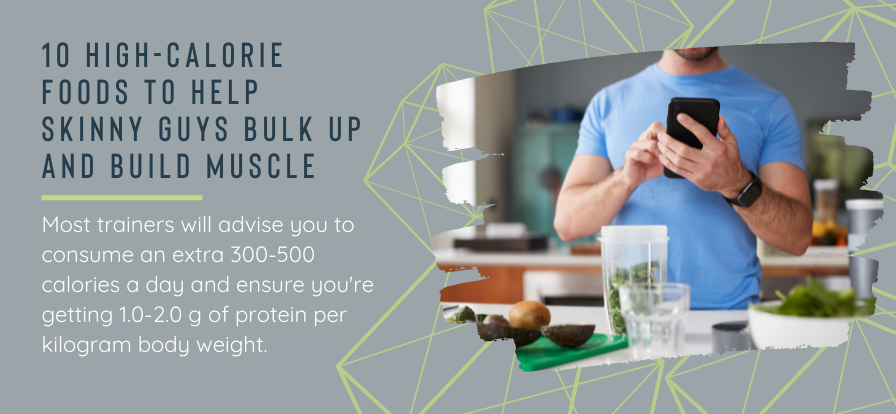10 High-Calorie Foods To Help Skinny Guys Bulk Up and Build Muscle
Written by Stephanie Hodges, MS in Nutrition and Exercise Science, Edited by Martin Ebner, head PT and Sports Nutrition Specialist at Ebylife.
Skinny guys face a unique struggle while trying to put on muscle and gain weight. While everyone else seems to be fixated on finding low-calorie, low-carb, and low-fat options, skinny guys need high-calorie, nutrient-dense foods to meet their goals of bulking up.
Sure, there are plenty of crash diets and fad workouts out there that promise a fast track to bulging biceps but without sufficient calorie intake, your body will struggle to build muscle and maintain it long-term.
So if you're ready to bulk up in a healthy way, you need to consistently up your calories, we have 10 high-calorie foods in this blog post that are perfectly suited for skinny guys looking to gain weight.
How Do You Choose the Right Foods To Bulk Up?
When it comes to building muscle, all calories are not created equal. While it's possible to gain weight by consuming massive amounts of junk food high in calories, this approach does more harm than good. You'll bulk up, but you may be gaining more fat than muscle – and damaging your health in the process!
The problem with "dirty bulking" is that you consume foods that are calorie-dense but nutrient-poor. In the end, this is less effective for building muscle and can leave you sluggish and with excess fat.
In contrast, a clean bulking diet includes nutrient-dense whole foods like lean protein, fruit, nuts, and vegetables. Not only do these foods provide the necessary energy for building muscle, but they also promote overall health, prevent disease, boost your immune system, and give you energy.
With a lean bulking approach, you can achieve your fitness goals without experiencing fat gains or causing problems like high cholesterol, high blood pressure, etc. So if you're serious about building muscle and staying healthy, choose clean bulking over dirty bulking every time.
Read More: Clean Bulking vs Dirty Bulking: Which is Best for Muscle Growth?
The Ultimate Bulk-up Diet Plan
Welcome to the ultimate Bulk-Up diet plan for skinny guys.
What’s included in the diet plan:
✔ A fully comprehensive and easy-to-follow 7-day food plan (To be repeated until you reach your ideal weight and/or results).
✔ A carefully calculated calorie surplus, macronutrient split and precise measurements to maximize weight gain and encourage muscle growth for Skinny guys.
✔ 2 Delicious post-workout smoothie recipes to help fuel your gains.
✔ A weekly grocery list and instructions.
✔ A sample workout from our 5-day split bulk-up workout plan for skinny guys.
✔ Combines perfectly with all of our Skinny Guy bulk-up workout plans.
This diet plan is perfect for Ectomorphs and ‘hardgainers’ looking to build muscle and gain weight.
The file is in PDF format and is compatible with all phones, computers, and tablets.
10 Best High-Calorie Foods For Skinny Guys to Build Muscle
Now that we're clear that the quantity and quality of calories you consume matter, let's take a look at ten of the best high-calorie foods for skinny guys looking to add serious muscle mass.
1. Nuts and seeds
Nuts and seeds are an excellent source of healthy fats, protein, and calories. They're also easy to eat on the go, making them a perfect snack. You can consume nuts and seeds by themselves, in trail mix, or as a topping for salads and other dishes.
Almonds, in particular, are a great source of vitamin E, magnesium, and fiber. Just a handful of almonds (about 20) contains approximately
7 grams of protein
12 grams of healthy fats
3 grams of fiber
7 grams of carbs
120 calories
Nuts and seeds are versatile and can be added to a range of dishes. Sprinkling pumpkin seeds or almonds on top of your favorite dish, or adding walnuts to your oatmeal, can add a significant number of calories each day.
Nuts and seeds to add to your diet include:
Almonds
Cashews
Walnuts
Hazelnuts
Macadamia nuts
Brazil nuts
Pistachios
Pumpkin seeds
Sunflower seeds
2. Nut butter
Made from nuts and seeds, nut butters are another option for adding calories to your diet. You can buy them pre-made or make your own at home. All you need is a food processor and some nuts or seeds of your choice.
You can spread nut butter on toast, add it to smoothies, or eat it straight off a spoon. Another delicious snack option is spreading nut butter on apples, bananas, or celery.
Some popular choices for nut butter include:
Peanut butter
Almond butter
Hazelnut butter
Cashew butter
Sunflower butter or sunbutter
3. Olive oil
Olive oil is a healthy source of calories and fat. Of course, you can use it while cooking, but you can also add it to vegetables, pasta or whole grains, or use it as a salad dressing.
One tablespoon of olive oil has 120 calories and 14 grams of fat. You can see how a few tablespoons throughout the day can quickly add up! Olive oil contains monounsaturated fats, which are the heart-healthy kind. Olive oil also contains polyphenols, which are known to have antioxidant properties.
You'll find many varieties of olive oil lining grocery store shelves. Extra virgin olive oil is made via cold press and is the freshest, least processed option available.
4. Avocado
Avocados are often praised for their high healthy fat content, and for good reason!
One small to medium-sized avocado has about 230 calories and 21 grams of fat. Similar to olive oil, avocados contain primarily monounsaturated fats (MUFA). Research suggests that consuming MUFAs mediates blood pressure, promotes healthy blood lipid profiles, improves insulin sensitivity, and regulates glucose levels. Furthermore, it appears that the body is more likely to oxidize and metabolize MUFA which improves body composition.
Avocados are creamy and delicious, making them a perfect addition to smoothies, salads, sandwiches, or even just eaten plain with some salt and pepper. You can also smash up avocados with salt, pepper, and lime juice for an easy guacamole dip.
5. Weight gainer powders and shakes
Weight gainer shakes are a popular choice for skinny guys looking to bulk up. They usually contain a mix of protein, carbs, and fats to help you balance your macros while meeting daily calorie goals.
You can find weight gainer shakes in most sports nutrition stores or online. Read the label carefully to ensure it contains ingredients you're comfortable with.
A typical weight gainer powder contains:
Protein (whey, casein, or plant-based)
Carbs (oats, rice, sweet potato, tapioca, maltodextrin, etc.)
Fats (medium-chain triglycerides, coconut oil, etc.)
Vitamins and minerals
Read more: Complete Protein Supplements Guide: Everything you need to know about protein for fitness goals
6. Full-fat milk and yogurt
Dairy products such as full-fat milk and yogurt are excellent sources of protein, calcium, and healthy fats. And there are many ways to consume them. You can drink milk cold or warm, add it to cereal or oatmeal, or use it in smoothies or shakes for added creaminess and extra calories.
Yogurt is a great grab-and-go snack. You can also add it to smoothies or layer in a parfait with nuts, seeds, and granola which are all high-calorie yet nutritious ingredients.
One cup of whole milk contains about 153 calories, 8 grams of protein, and 8 grams of fat. Adding just one or two cups a day can make a big difference in meeting your calorie goals.
7. Cheese
Cheese—some would say it's the perfect food. Whether it's standing alone on a charcuterie board, topping a burger or sandwich, or mixed into your favorite casserole or pasta dish, cheese is delicious and, best of all, it can help you bulk up.
Cheese is packed with protein and calories. Additionally, cheese is a good source of calcium and other nutrients that are essential for bone health.
Some cheeses are lower in fat and higher in protein, which can be the optimal choice when you're looking to add lean muscle and avoid fat gain. These cheese include:
Mozzarella
Ricotta
Cheddar
Swiss
Feta
Goat cheese
Cottage cheese
8. Butter
Butter adds calories with virtually no bulk. This can be helpful when you're consuming as much food as your stomach can handle, but still need more calories added to your daily balance.
Butter is a good source of healthy fats and vitamins A, D, E, and calcium. It's also easy to digest for most people. You can add butter to just about anything—vegetables, potatoes, toast, eggs, pasta—you name it!
Although butter has sometimes had mixed reviews (especially for those who are trying to lose weight), an article on WebMD cites potential health benefits of butter because of the vitamins it contains; vitamins A, D, and E are fat-soluble, which means your body needs fat to absorb them! Potential benefits of these vitamins include helping improve the health of your skin, eyes, and bones.
9. Fatty fish
Fatty fish like salmon, mackerel, and sardines are not only a great source of protein but also contain heart-healthy omega-3 fatty acids. Omega-3 fats have anti-inflammatory benefits and have been linked with a reduced risk of chronic diseases like heart disease, stroke, and diabetes.
Fatty fish like salmon also contain vitamin D, which is essential for bone health.
When it comes to meat and seafood options, fatty fish is not only one of the healthiest choices, it’s one of the highest calorie options out there with about 350 calories in a 6-ounce portion of cooked salmon.
If you're strictly plant-based, you can still receive the benefits of fats from Performance Lab Omega 3 without the fish!
10. Carbs, carbs, carbs
We know, that carbs get a bad rap and are considered the enemy in many weight-loss diet plans. But carbohydrates are an essential macronutrient and are your body's preferred source of energy.
We're not talking about processed snacks, candy, and foods and beverages loaded with sugar, however. Instead, choose whole foods containing complex carbs, essential vitamins, minerals, and other nutrients.
Some high-calorie carbohydrate options include:
Whole grains like quinoa, brown rice, and whole-wheat bread
Whole wheat pasta
Beans and legumes like chickpeas and black beans
Starchy vegetables like sweet potatoes, yams, peas, corn, carrots, and squash
Oatmeal, granola, and other breakfast cereals
How Many Calories Do Skinny Guys Need to Bulk Up?
Now that you’re armed with this list of ten delicious high-calorie foods that help skinny guys bulk up, you're probably wondering exactly how many calories you need each day.
Most trainers will advise you to consume a minimum of 500 calories a day and ensure you're getting 1.0-2.0 g of protein per kilogram body weight. Also, remember that you need consistent, progressive strength training in order to build muscle. Calories will not magically become muscle; you have to train those muscles regularly.
You can utilize an online calculator like the Omni Calculator to get specific and determine how many calories you should be consuming daily to help you meet your goals.
Finally, remember to be patient and trust the process. With consistency, you will see the results you’re looking for!
The Ultimate Bulk-up Diet Plan
Welcome to the ultimate Bulk-Up diet plan for skinny guys.
What’s included in the diet plan:
✔ A fully comprehensive and easy-to-follow 7-day food plan (To be repeated until you reach your ideal weight and/or results).
✔ A carefully calculated calorie surplus, macronutrient split and precise measurements to maximize weight gain and encourage muscle growth for Skinny guys.
✔ 2 Delicious post-workout smoothie recipes to help fuel your gains.
✔ A weekly grocery list and instructions.
✔ A sample workout from our 5-day split bulk-up workout plan for skinny guys.
✔ Combines perfectly with all of our Skinny Guy bulk-up workout plans.
This diet plan is perfect for Ectomorphs and ‘hardgainers’ looking to build muscle and gain weight.
The file is in PDF format and is compatible with all phones, computers, and tablets.






